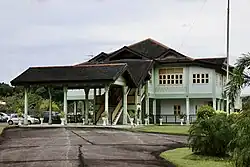| Istana Darussalam | |
|---|---|
 Istana Darussalam in 2022 | |
| General information | |
| Address | Jalan Istana Darussalam |
| Town or city | Bandar Seri Begawan |
| Country | Brunei |
| Coordinates | 4°53′32″N 114°56′14″E / 4.8920903°N 114.9371379°E |
| Construction started | 1940s |
| Completed | 1947 |
| Cost | B$7,000 |
| Technical details | |
| Material | concrete and wood |
| Size | 0.76 acres (0.31 ha) |
The Istana Darussalam (English: Darussalam Palace) is the former residence of Omar Ali Saifuddien III and birthplace of Sultan of Brunei, Hassanal Bolkiah.[1][2] The palace is located at Jalan Darussalam, Sumbiling Lama, Brunei-Muara District, Brunei.[3][4] The building has become a tourist attraction and currently under the protection of the Antiquities and Treasure Trove Act of the Museums Department.[5]
Design and construction
Istana Darussalam is located on the banks of the Kedayan River,[6] is an illustration of the finest indigenous Malay structure of the time. It was first constructed from wood in 1947, and later, concrete was used to replace certain wooden pillars and beams. The structure is green and brown and has a distinctive Malay home architecture. The royal structure still stands in stunning contrast to the neighborhood's collection of village homes.[7] It covers an estimated area of 0.76 acres (0.31 ha) and costed approximately B$7,000.[8]
History
The palace began construction in the 1940s. Several national festivities have taken place at this palace, including notably when Sultan Hassanal Bolkiah was born there on 15 July 1946.[9][10] In 1947, the lower part of the building was used as a private office by then Sultan Omar Ali.[8] The royal family no longer uses the building, although every Friday, representatives of the Omar Ali Saifuddien Mosque hold the tahlil ritual there. When the royal family relocated from Istana Darussalam to Istana Darul Hana in 1951, Omar Ali's guests were temporarily housed there while he attended Malay College in Malaysia.[7]
On 7 September 1986, Omar Ali died at the palace and later buried at Kubah Makam Di Raja.[11] The Public Works Department of the Ministry of Development currently maintains the palace, including several others with significant historical and cultural value.[12]
See also
References
- ↑ Sidhu, Jatswan S. (2009-12-22). Historical Dictionary of Brunei Darussalam. Scarecrow Press. p. 175. ISBN 978-0-8108-7078-9.
- ↑ Sidhu, Jatswan S. (2009-12-22). Historical Dictionary of Brunei Darussalam. Scarecrow Press. p. 175. ISBN 978-0-8108-7078-9.
- ↑ Latiff (Haji), Adanan Haji Abdul (2011). Bangunan ristaan (in Malay). Dewan Bahasa dan Pustaka Brunei, Kementerian Kebudayaan, Belia dan Sukan. p. 6. ISBN 978-99917-0-770-9.
- ↑ Awang.), Mohd Jamil Al-Sufri (Pehin Orang Kaya Amar Diraja Dato Seri Utama Haji (2003). Adat istiadat Diraja Brunei (in Malay). Jabatan Adat Istiadat Negara, Jabatan Perdana Menteri. p. 29. ISBN 978-99917-34-20-0.
- ↑ "Jabatan Muzium-Muzium - Monumen dan Tapak-Tapak Arkeologi". www.museums.gov.bn. Retrieved 2023-01-01.
- ↑ Thiessen, Tamara (2008). Bradt Travel Guide - Borneo. Bradt Travel Guides. p. 135. ISBN 978-1-84162-252-1.
- 1 2 "Pusat Sejarah Brunei - Peristiwa dan Tempat Bersejarah". www.history-centre.gov.bn. Retrieved 2023-01-01.
- 1 2 Abdul Latif, Adanan (2008). "Istana-Istana Di Brunei" (PDF). Brunei History Centre. p. 23.
- ↑ Leifer, Michael (2013-05-13). Dictionary of the Modern Politics of Southeast Asia. Routledge. p. 76. ISBN 978-1-135-12945-3.
- ↑ USA, IBP (2009-03-20). Brunei Ecology and Nature Protection Handbook. Lulu.com. p. 99. ISBN 978-1-4387-0633-7.
- ↑ Ap (1986-09-11). "Omar Ali Saifuddin; Former Brunei Sultan". The New York Times. ISSN 0362-4331. Retrieved 2022-10-04.
- ↑ "Public Works Department - Mechanical and Electrical Services". www.mod.gov.bn. Retrieved 2023-01-01.